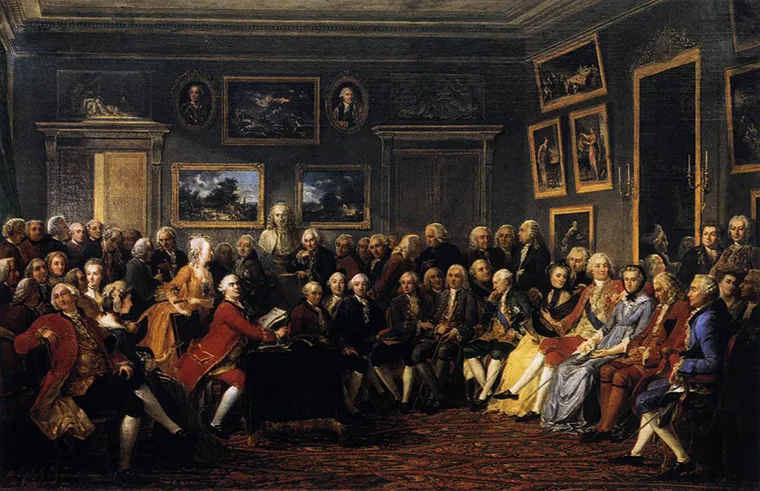
The Role of the Enlightenment in Shaping Modern Thought and Politics
The Enlightenment, also known as the Age of Reason, stands as a pivotal period in human history, profoundly impacting modern thought and politics. Spanning roughly from the late 17th to the early 19th centuries, this era witnessed an unprecedented surge in intellectual curiosity, critical thinking, and innovation. This essay will delve into the intricate role of the Enlightenment in shaping our modern world, exploring its multifaceted influence on political systems, philosophical discourse, and societal structures, while also acknowledging its inherent complexities and criticisms.
I. The Enlightenment: A Detailed Exploration
The Enlightenment was not a monolithic movement but rather a complex and multifaceted intellectual and cultural phenomenon that emerged in Europe. It was characterized by a shared commitment to reason, individualism, and the pursuit of progress, challenging established authorities and advocating for radical reform across various societal spheres. This wasn’t a sudden revolution but rather a gradual shift in thinking, a culmination of centuries of intellectual ferment and scientific advancements. Key features of this era include:
Emphasis on Reason and Empirical Evidence: The Enlightenment thinkers strongly advocated for the application of reason and empirical evidence as the primary tools for understanding the world. This contrasted sharply with the reliance on religious dogma and tradition that had dominated previous eras. The scientific revolution, with its emphasis on observation, experimentation, and the formulation of testable hypotheses, provided a powerful model for this new approach to knowledge acquisition. Figures like Francis Bacon, with his emphasis on inductive reasoning, and Isaac Newton, with his groundbreaking work in physics, laid the groundwork for this paradigm shift.
Individualism and Human Rights: The Enlightenment fostered a new emphasis on the individual, challenging the hierarchical structures of the past. Thinkers like John Locke articulated the concept of natural rights, inherent to all individuals, including the rights to life, liberty, and property. This focus on individual autonomy had far-reaching implications for political theory, influencing the development of democratic ideals and challenging the legitimacy of absolute monarchy. The inherent dignity and worth of each individual became a central tenet of Enlightenment philosophy, paving the way for future movements advocating for social justice and equality.
The Social Contract Theory: Central to Enlightenment political thought was the concept of the social contract. Thinkers like Thomas Hobbes, John Locke, and Jean-Jacques Rousseau explored the relationship between the individual and the state, arguing that legitimate government derives its authority from the consent of the governed. This idea fundamentally challenged the divine right of kings and laid the groundwork for the development of representative government and constitutionalism. Different interpretations of the social contract led to varying political philosophies, influencing the development of both liberal and republican systems of government.
Secularism and the Separation of Church and State: The Enlightenment witnessed a growing trend towards secularism, challenging the dominant role of the Church in society and politics. Thinkers questioned the authority of religious institutions and advocated for the separation of church and state. This did not necessarily imply atheism but rather a recognition of the importance of religious tolerance and the autonomy of the individual in matters of faith. This gradual separation of religious and political authority significantly altered the relationship between the state and its citizens.
Progress and Optimism: A prevailing sentiment among Enlightenment thinkers was a profound optimism about human progress. They believed that through reason and education, humanity could overcome ignorance, superstition, and oppression, paving the way for a better future. This optimistic view of human potential fueled various social and political reform movements and provided a powerful impetus for scientific and technological innovation. However, this optimistic view was not without its critics, who pointed to the persistent inequalities and injustices that existed even within Enlightenment societies.
II. The Enlightenment’s Impact on Modern Politics
The Enlightenment’s influence on modern politics is undeniable. Its core principles directly contributed to the rise of liberal democracy and the establishment of human rights as fundamental principles of governance. Several key aspects highlight this transformative impact:
The American and French Revolutions: The American and French Revolutions, pivotal events in the late 18th century, stand as powerful testaments to the Enlightenment’s impact. The Declaration of Independence, with its emphasis on natural rights and popular sovereignty, directly echoes Lockean principles. Similarly, the French Declaration of the Rights of Man and of the Citizen, inspired by Enlightenment ideals of liberty, equality, and fraternity, fundamentally altered the political landscape of Europe. These revolutions served as models for subsequent democratic movements across the globe, shaping the course of modern political history.
The Rise of Constitutionalism: The Enlightenment’s emphasis on the social contract and the limitation of governmental power led to the rise of constitutionalism. Constitutions, outlining the structure and powers of government and guaranteeing fundamental rights to citizens, became a cornerstone of modern democratic systems. This emphasis on written laws and checks and balances aimed to prevent the arbitrary exercise of power and protect individual liberties, creating a framework for stable and accountable governance.
The Development of Representative Government: The Enlightenment’s focus on popular sovereignty and the consent of the governed led to the development of representative forms of government. Parliamentary systems and republican governments, with their emphasis on elected representatives and the separation of powers, became increasingly prevalent, replacing absolute monarchies and promoting greater citizen participation in political decision-making. This shift fundamentally altered the relationship between the rulers and the ruled, leading to greater accountability and responsiveness on the part of the state.
The Emergence of International Law and Human Rights: The Enlightenment’s emphasis on universal human rights provided a foundation for the development of international law and human rights norms. The concept of universal moral principles, applicable to all individuals regardless of nationality or ethnicity, gained increasing traction, influencing the formation of international organizations and the establishment of international human rights law. This shift towards a globalized understanding of human rights continues to shape international relations and efforts to protect human dignity worldwide.
III. The Enlightenment’s Influence on Modern Thought
The Enlightenment’s impact extended far beyond the realm of politics, profoundly shaping modern thought across a range of disciplines:
The Rise of Modern Science: The Enlightenment’s emphasis on reason and empirical evidence provided a fertile ground for the advancement of modern science. The scientific method, with its focus on observation, experimentation, and the formulation of testable hypotheses, became the dominant paradigm for scientific inquiry. This led to significant breakthroughs in various scientific fields, further solidifying the belief in the power of human reason to understand the natural world. The scientific revolution, which had its roots in the preceding centuries, truly flourished during the Enlightenment, transforming our understanding of the universe and our place within it.
The Development of Modern Philosophy: Enlightenment thinkers made significant contributions to the field of philosophy, revolutionizing the way we think about knowledge, morality, and the human condition. Thinkers like Immanuel Kant, with his critical philosophy, and David Hume, with his empiricism and skepticism, fundamentally altered the landscape of philosophical inquiry. Their work laid the foundation for subsequent developments in epistemology, ethics, and metaphysics, shaping the course of modern philosophical thought.
The Rise of Social Sciences: The Enlightenment’s emphasis on understanding human behavior and social structures contributed to the rise of the social sciences. The development of disciplines like sociology, political science, and economics reflected an increasing interest in applying rational analysis to the study of society and human interaction. This new focus on empirical research and systematic analysis provided a framework for understanding social phenomena and devising policies aimed at addressing social problems.
The Spread of Education and Literacy: The Enlightenment’s belief in the power of education and the importance of critical thinking led to increased efforts to promote literacy and education among the wider population. This emphasis on the dissemination of knowledge and the empowerment of individuals through education contributed to a gradual shift towards more inclusive societies, challenging the limitations of traditional educational systems.
IV. The Enlightenment’s Legacy in Modern Society
The Enlightenment’s legacy continues to resonate deeply in contemporary society, shaping our institutions, values, and worldview:
Modern Liberal Democracy: The principles of individual liberty, limited government, and popular sovereignty, central to Enlightenment thought, are the foundation of modern liberal democracies. The rule of law, free speech, and free markets, essential components of these systems, directly reflect the Enlightenment’s emphasis on individual rights and limited government intervention. Even with its imperfections, modern democracy remains a powerful testament to the enduring influence of Enlightenment ideals.
Social Justice Movements: The Enlightenment’s emphasis on equality and human rights has played a crucial role in the development of social justice movements. The abolitionist movement, the women’s suffrage movement, and the civil rights movement, among others, drew heavily on Enlightenment ideals of equality and justice, challenging existing power structures and advocating for the expansion of rights and opportunities for marginalized groups. These movements continue to inspire contemporary struggles for social and political justice worldwide.
Scientific and Technological Progress: The Enlightenment’s emphasis on reason and scientific inquiry has fueled centuries of scientific and technological progress. The relentless pursuit of knowledge and innovation, rooted in Enlightenment principles, has led to remarkable advancements in various fields, improving the quality of life for countless individuals around the globe. This continuous pursuit of progress remains a defining feature of modern society.
Secularism and Religious Tolerance: The Enlightenment’s gradual separation of church and state and its emphasis on religious tolerance have profoundly impacted the relationship between religion and society. While religious faith continues to play a significant role in many lives, the separation of religious and political authority has promoted greater religious freedom and minimized conflict between religious groups.
V. Criticisms and Challenges to the Enlightenment
Despite its profound and largely positive impact, the Enlightenment has faced significant criticisms:
Eurocentrism and Colonialism: The Enlightenment, while advocating for universal human rights, often failed to fully extend these rights to those outside of Europe. Colonial expansion, fueled in part by Enlightenment ideals of progress and civilization, resulted in the exploitation and oppression of non-European populations. This hypocrisy and inherent contradiction undermines the universality claimed by many Enlightenment thinkers.
Social Inequality and Exclusion: While promoting individual liberty, the Enlightenment often overlooked or ignored existing social inequalities based on gender, race, and class. The exclusion of women, people of color, and other marginalized groups from full participation in Enlightenment discourse and its benefits casts a shadow on its legacy of universalism.
The Dangers of Reason and Progress: Some critics argue that the Enlightenment’s emphasis on reason and progress has had unintended negative consequences. The belief in technological advancement without considering its ethical and social implications has led to environmental degradation and other unforeseen problems. The pursuit of progress without adequate consideration for its potential consequences has sparked concerns about its sustainability and ethical implications.
The Limitations of Reason: Some post-Enlightenment thinkers argue that reason alone cannot fully capture the complexity of human experience and emotion. They critique the Enlightenment’s tendency to prioritize rationality over other forms of knowledge and understanding, such as intuition, spirituality, and emotional intelligence.
VI. Conclusion: The Enduring Legacy of the Enlightenment
In conclusion, the Enlightenment remains a pivotal era in human history, profoundly shaping our modern world. Its emphasis on reason, individualism, human rights, and progress has fundamentally altered political systems, philosophical discourse, and societal structures. The rise of liberal democracy, the advancement of science and technology, and the ongoing struggle for social justice are all testaments to its enduring legacy. However, it is crucial to acknowledge the complexities and contradictions inherent in the Enlightenment project, recognizing its limitations and failures in addressing social inequalities and its role in colonial expansion. By critically examining both the achievements and shortcomings of the Enlightenment, we can gain a more nuanced understanding of its impact and strive to build a more just and equitable future, informed by its enduring ideals while addressing its unresolved challenges. The ongoing debates surrounding the Enlightenment’s legacy underscore its continuing relevance in grappling with the complex issues facing our contemporary world. Its ideals, while imperfect, continue to inspire movements for social justice and the pursuit of a more humane and rational society.


